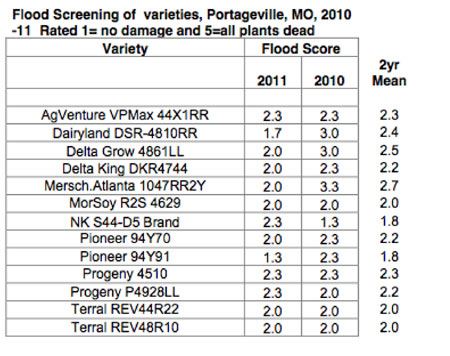Breeding Soybeans For Flooding Tolerance
PORTAGEVILLE, MO.
Excess rain and over-irrigation on poorly drained fields or low lying areas can result in flooding and soil water-logging. Soybeans often never fully recover from flooding injury resulting in serious yield losses. Soybeans differ in their ability to tolerate soil water-logging. Flood damage was assessed by taking visual ratings on PIs two to three weeks after flooding and severe plant injury. A flood tolerance yield index to determine PIs with the least yield loss under flooding was calculated for each RIL by subtracting yield under flooding from yield under optimum conditions and dividing the difference by optimum yield x 100 as follows:
We have found that most tolerant varieties have shown yield reductions to severe flooding of 40 percent versus 80 percent for sensitive strains. We have evaluated 500 commercial varieties under severe flooding over three years on a Sharkey clay zero grade field and found some tolerance among varieties. Best varieties for flooding tolerance over the past two years are as follows:

However, under severe flooding current varieties are severely injured. Thus, flood tolerance is not strong enough among varieties farmers grow today and better tolerance is needed. Lines grown from a cross to integrate tolerance from the plant introduction PI408105A from Korea showed higher tolerance to a severe flooding event than current varieties as shown in hill plots. Exotic plant introductions from China, Korea and Japan show promise for finding genes to breed soybeans for higher tolerance to flooding. A few newly evaluated plant introductions showed better tolerance than flood tolerant PI408105A that was previously discovered prior to these experiments. PI574476A, a group IV line showed excellent tolerance to flooding and likely has useful genes for incorporating higher flooding tolerance into high yielding varieties. Δ
SCOTTY SMOTHERS: Research Associate/Soybean Breeding, University of Missouri